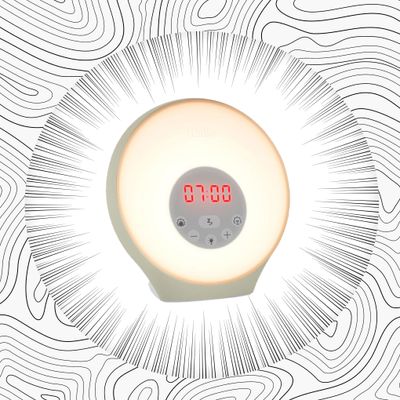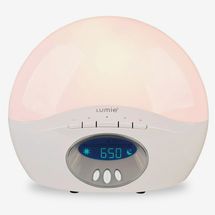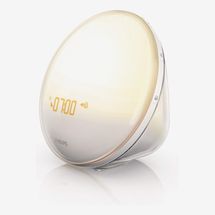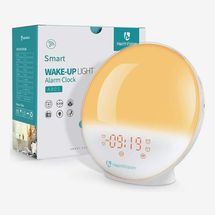
Let me tell you a horror story about city living. Woman moves into a new apartment with windows facing the street. Woman realizes that streetlights shine in through said windows and make it too bright to sleep. Woman buys blackout blinds. Woman then finds that despite always being a “morning person,” waking up now feels almost painful, like she is a bear being roused from hibernation. Her brain is thick and dull as lead soup, her body heavy like logs.
This is a story I know all too well. The paradox of thick shades, which help me sleep at night, is that they also make it too dark to wake up. My phone alarm would find me bleary and confused, and I often overslept after turning it off. So I did what any reasonable sleepy person would do: I caved to my targeted ads on Instagram and bought a sunrise alarm clock, the kind that gradually lights up your room until it chirps you awake. Almost right away, I returned to my normal, “morning person” self again.
How does this work? “Your brain is always trying to predict dawn and dusk. Historically, this was essential for survival, as land-based animals, we had to work out when the sun was coming up and going down,” explained Dr. Rafael Pelayo, a clinical professor at the Stanford Center for Sleep Sciences and Medicine. In fact, light is one of the most important ways that our brains perceive time. “There’s a part of the brain called the suprachiasmatic nucleus, and it acts like a conductor to synchronize all the rhythms the body has, like the circadian rhythm that controls our sleep cycles,” said Dr. Pelayo. “This nucleus sits right above where the optic nerves from your eyes cross, so the light hitting your eyes in the morning helps set that clock and tell it that it’s dawn.”
When I relayed my own experience to Dr. Pelayo, he said what I’d been feeling in the morning is known as sleep inertia or sleep drunkenness — being physically awake but feeling unable to move or think as normal. In the sleep-science world, sunrise alarm clocks are known as “dawn simulators,” and the gradual way they light up the room is part of why they can help people wake up refreshed, in that they mimic a natural morning.
There’s a whole variety of sunrise clocks on the market — mine is the Lumie brand — but they all do pretty much the same thing with increasing price tags for add-ons like meditation features. For the most part, you can dictate when and how long you want the wake-up cycle to be, and what kind of noise eventually rouses you. Some of the clocks use different light “colors,” touting research that blue light stimulates your brain and makes you more awake. Dr. Pelayo said there’s no doubt that light is beneficial to the waking-up process, but the research has yet to definitively indicate which color and intensity is ideal.
On that note, it’s also hard to say whether the amount of light produced by a sunrise alarm clock is enough to stimulate the wake-up response, said neurologist Guy Leschziner, the author of The Nocturnal Brain: Nightmares, Neuroscience and The Secret World of Sleep. However, it should at least help: “If you give people a burst of very, very bright light, early in the morning, then you can actually push your body clock forward and make them wake up earlier,” he said.
And of course, it’s no substitute for a good night’s sleep. If you don’t get enough hours of shut-eye, you’re not going to feel great the next day, no matter how gentle and “natural” your alarm is. But if your problem is merely with waking up, you might find a sunrise alarm clock useful, especially if you need pitch-blackness to get to sleep in the first place.
Every product is independently selected by our editors. Things you buy through our links may earn us a commission.







